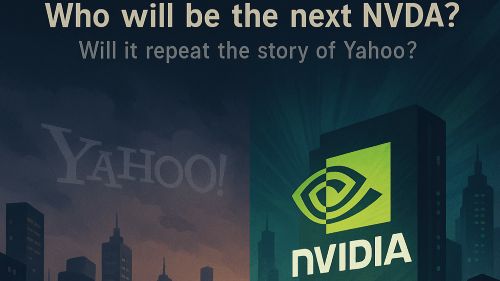AI Navigation
- articleAI Trends
- lightbulb_2AI Tips
- assistant_navigationAI Navigation
- heatHot Articles
- emergency_heat_2Hot Tips
- format_list_numberedPrompt Formatter
- psychologyTest Center(RPI)
Who will be the next NVDA? Will it repeat the story of Yahoo?
When Yahoo was leading the pack, there was no rival.
Search engines, classified directories, email, finance, entertainment, and news are all its killer weapons. The most amazing thing is that wherever Yahoo goes, investors like it and users like it even more.
Look at NVDA today. Every press conference of its is the focus of the market. Forums, news, and videos are full of discussions about it. Its attention is higher than that of Google and Apple.

On April 12, 1996, Yahoo went public. Four years later, Yahoo's stock price reached its peak, reaching $118 in the US. NVDA went public on January 22, 1999. That year, NVDA released GeForce 256, the world's first product officially called GPU (graphics processor). How many people knew that this would be an important milestone for NVDA to become glorious?
In 2000, the Internet bubble came. Yahoo's stock price also fell from its high point. For capital, as long as your product is loved by users and there are no competitors for the time being. It is a very good business to go long again after shorting.
But Yahoo was wrong. Its classified directory, mailbox, finance, entertainment, and news all need powerful search engines to process. Even if it does not focus on search engines, it can pay attention to the market and be the leader of search engines. Investment or acquisition is a good business. However, it chose to cooperate with Google in 2000.
Did Yahoo choose Google to solve the huge pain points of its users, or did it think that the moat of its products was too big to be invincible? This is unknown.
However, from the moment it cooperated with Google, its business seemed to be seen through by the other party.
In 2000, Google launched the AdWords advertising system, Gmail and maps. Once such products were launched, they were deeply loved by users. Smart capital has long seen this. In this wave of Internet wave, Google is definitely another king.
Once your product or service is not replaceable, when users have more and more choices, then Yahoo's story is over. Four years later, Yahoo and Google ended their cooperation. Sadly, Yahoo has not yet started its own search engine, but has turned its cooperation to Microsoft.
The Yahoo empire is destined to decline. It is worth noting that in 2006, NVDA released CUDA. This is absolutely epoch-making for NVDA, especially 17 years later, who doesn't know NVDA? Sadly, NVDA's revenue has not improved much with the emergence of CUDA, and the stock price is also quite cheap.
No one cares about NVDA? Ten years have passed.
In 2016, NVDA made significant progress in the field of graphics processing units and began to emerge in the fields of artificial intelligence and deep learning. This journey has been 23 years since the establishment of NVDA. How many 23 years are there in life? This year, Nvidia's founder Huang Renxun is already 53 years old.
There is a proverb in the East that it takes ten years to sharpen a sword. But Yahoo and Google took less than 10 years when they were at the forefront of the Internet. How long will NVDA have to wait?
At the close of the U.S. stock market on June 18, 2024, NVDA's total market value reached 3.34 trillion U.S. dollars, surpassing Microsoft and Apple. Five months later, on October 25, NVDA's market value also reached 3.53 trillion U.S. dollars, slightly higher than Apple's 3.52 trillion U.S. dollars, and briefly replaced Apple as the world's most valuable company.
It took NVDA 25 years to go from obscurity to becoming the world's largest company by market value. It was thought that CUDA's ecosystem was unmatched for a while, and NVDA's own high-end chips were indispensable for AI training, but in February 2025, a spoiler appeared, and overnight, DeepSeek, a company, enjoyed the world.
DeepSeek proved one thing to capital, the possibility of achieving high-performance AI at a lower hardware cost. What's more frightening is that it has a certain impact on NVDA's CUDA ecosystem, which will make investors worry whether there will be more companies that can bypass CUDA and affect NVDA's software ecosystem.
Back to the previous Yahoo, if a user can choose another company of the same type, then Yahoo is no longer unique. Looking at today's NVDA, who will be the next company to challenge CUDA?
Once CUDA is no longer the only choice, who will be the next NVDA? Just like under the wave of the Internet, Yahoo fell, but Google appeared.
The world is ultimately diverse, but when a monopoly appears, it is the beginning of the decline of the monopoly. Guess who will be the next NVDA? Or let's change the direction. Will it appear in Europe, Asia, or the United States?
For more thoughtful content, please lock on https://iaiseek.com/.